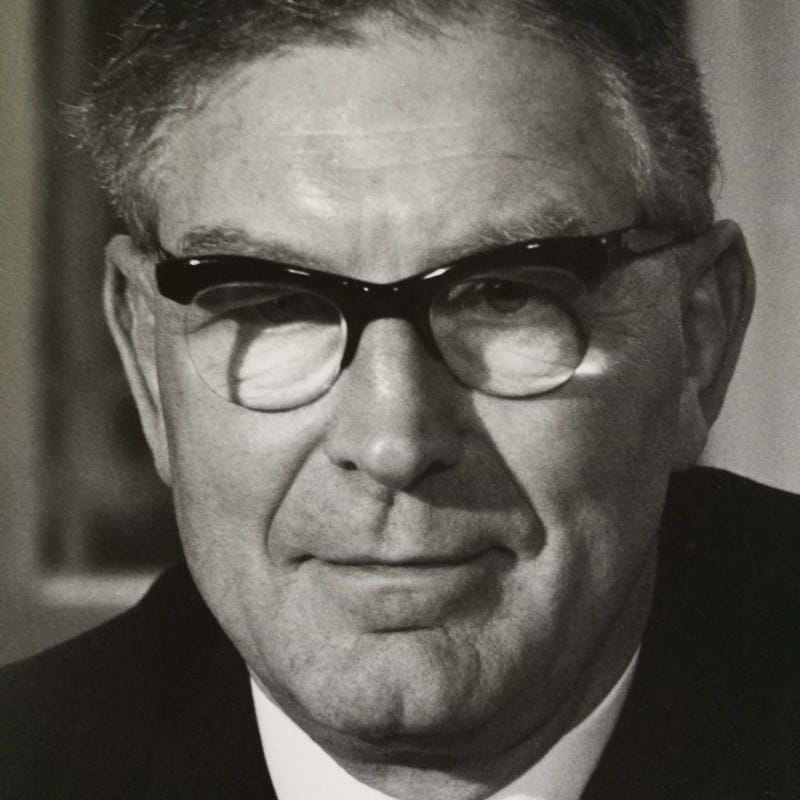
Frederick Edward (Ned) Warner: 1966–1967
Frederick Edward ("Ned") Warner was born in 1910, the son of a detective inspector, and gained a scholarship to Bancroft's School and his boyhood ambition was to become a lawyer. However, when he was awarded an Old Bancroftian Exhibition, he elected to read Chemistry at University College London. He plunged enthusiastically into student affairs, both at College and University level, but in spite of his preoccupations, which included probing philosophies of current political thought, he was awarded a first degree with honours and a postgraduate Diploma in Chemical Engineering. By the time he completed his academic career in 1934 he had become President of University College Debating Society and Captain of its Rugby Club, and President of the University Union (ULU) and of the Athletic Union.
Turning to industry, five years with A Boake, Roberts & Co Ltd brought him into close contact with brilliant organic chemists and it was here he realised the great challenge of chemical engineering - to give practical expression in the form of commercial production units of processes which had been successfully demonstrated on a laboratory scale.
In 1938 he was attracted to the British Launderers' Research Association, where he learnt much about the use and misuse of that basic commodity - water. Such a post, however, was insufficient of a challenge as a war effort and he joined Chemical Construction Ltd, erecting and commissioning sulphuric and nitric acid plants in Royal Ordnance Factories.
In 1944 Ned Warner's war effort was switched by joining APV Ltd to consider chemical engineering aspects of deep fermentation for antibiotic production; this was followed in the post-war years by standardising the design of processing equipment. In 1948 he found a fresh challenge in the opportunity to reorganise the works of Carless, Capel & Leonard Ltd and the engineering problems of distillation were added to an already wide experience.
In 1956 he found the perfect answer to his enquiring mind when he joined Cremer and Brearley (later to become Cremer & Warner), a partnership of consulting chemical engineers. Here he found an all-absorbing challenge to utilise and apply his great wealth of chemical engineering and management experience and professional activities which took him to India, Iran, Egypt, the Sudan, Rhodesia and Russia.
The encouragement of those who guided the fortunes of the Institution in the mid-1930s to the younger members consolidated his sense of obligation and duty in professional affairs, and he became an Associate Member in 1936 and a Member in 1942. From the time he joined the Education Committee in 1947 he has been intimately involved in Institution affairs. He played a leading part in organising the postgraduate refresher course, which resulted in the publication, jointly with Professor J M Coulson, of "A Problem in Chemical Engineering Design: The Manufacture of Mononitrotoluene".
He has served on all the standing committees of the Institution. He was a member of Council from 1948 to 1950, where he quickly established a reputation for taking the broad and detached view and being able to advise on Institution policy against a background gained from his great capacity for reading and his wide interests in many fields. In 1953 he joined M B Donald as Honorary Secretary and from 1962 to 1965 he continued to fill this office on his own. In 1955 the Institution awarded him the Osborne Reynolds Medal (later to become the Arnold Greene Medal) for his services. He made a generous contribution to the effort that was needed to prepare the application for the grant of a Royal Charter to the Institution in 1957, for he wrote the history of the Institution to that time.
He was among the leaders of the movement to integrate the engineering profession, being convinced of the great strength of the common foundation on which the Council of Engineering Institutions is based. Throughout, his sense of fairness was such that, although enthusiastically advocating policy which he considered to be right, he always graciously accepted the will of the majority.
Internationally, he was a representative of CEI on the Fédération Européene d’Associations Nationales d’Ingénieurs (FEANI), of which he was Vice President.
Return to list